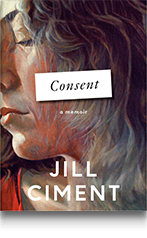A Conversation with Jill Ciment, author of Consent.
Consent is the story of your nearly half century relationship with your husband whom you met when you were 16 and he was 47, married, a father, and your art professor. It’s a rebuttal of your 1996 memoir, Half a Life. Why did you choose to tell your story again twenty-five years later?
When I originally wrote Half a Life, I believed I was telling the truth, the whole truth and nothing but the truth. But after my husband died in 2016 (at the age of 93), and as the #MeToo movement began to change my perceptions of sexual behavior and power imbalances, I started to wonder how truthful my first account was. For instance, our first kiss. The version of that kiss in Half a Life is not how I remember it today. Here’s what I remember today: The kiss took place after an evening life drawing class; we were alone in the classroom. I was completely infatuated with him as only a teenager with a crush can be. I remember he took my wrist, pulled me towards him, and kissed me. But when I reread Half a Life, I realized I hadn’t written it that way. I had written it as if I had been the sexual instigator. In that account, I have myself unbutton the top three buttons of my blouse, sneak up behind him, and kiss him.
Why did you write it that way in 1996?
I think I viewed myself—even that young—as someone who was always in charge. I never felt powerless. So maybe a way of illustrating that sense of self-agency was to make me the sexual aggressor. I wrote Consent to try to figure out why making myself the sexual aggressor seemed the truth in 1996.
In making yourself the aggressor, were you protecting him?
I don’t believe I was trying to protect him as much as I was trying to tell the truth of my own desire. I saw him. I wanted him. And even though I was only 17 (a birthday had passed) I went after him. I wasn’t so much making excuses for Arnold’s behavior in Half a Life as much as I was trying to empower myself. When I wrote that scene, Arnold and I had been living together for 25 years. Our relationship was one of the most stable, equitable marriages I knew. I didn’t see how to reconcile those truths with—let’s face it—his appalling behavior when I was his student. What I try to do in Consent is take those inconsistent memories and hold them at different angles against the light to see where the truth resides.
Back in 1970, nobody saw anything appalling in Arnold’s behavior?
Of course people must have. I remember going to a party of his middle-aged friends after we started living together, where the hostess served everyone a martini and me a glass of milk. So I’m sure people noticed. I was brazen in those days but I can’t help but think I must have been humiliated. Arnold always stood up for me, but he could hardly argue for an underage girl to be served liquor.
Tell us a little about Arnold.
He was compassionate, kind, a champion of the have-nots, and an amazing artist. He considered himself a feminist. But he was fallible and he crossed a line. Consent asks the reader to try to understand that the “line” wasn’t fixed, that it has shifted over the five intervening decades. I’m not condoning Arnold’s behavior as much as I am trying to illustrate how a compassionate man who championed women’s rights could find himself on the wrong side of that line.
Should we judge past behavior by today’s moral codes?
I think it is the core question the #MeToo Movement (and all the other movements that lead to cancel-culture) must ask. Is there any room for nuance? I have been asked multiple times if I thought my husband was a predator. The answer is that I never thought of myself as a victim.
In Consent, you not only explore the beginning of your relationship, you also write about the end of it. How did your relationship change over the years?
It’s the unmentioned part of sleeping with your teacher. It’s the part where suddenly you go from being the young lover to the caretaker. Taking someone—someone you have loved profoundly for 45 years—to death, that’s the most extraordinary experience there is. And so in some ways, who kissed whom first seems really small in the length of that journey.
Did anything change for you writing the book?
As I was writing Consent, I came to realize there were three Jills weighing in—the love-struck teenager in 1970, the middle-aged memoirist looking back at her marriage’s disturbing beginnings in 1995, and now, in 2023, the 70-year-old writer who knows how the love story ends. Just as my middle-aged self came to forgive my teenage self while writing Half a Life, I came to understand and forgive my middle-aged self who may or may not have told the truth.
What do you hope readers take away from reading Consent?
That marriages are complex, and messy, and mysterious. That relaying the story of a marriage over four decades is as impossible as retelling a dream and making it sound logical. That the way a story ends often changes the way you see the beginning.


